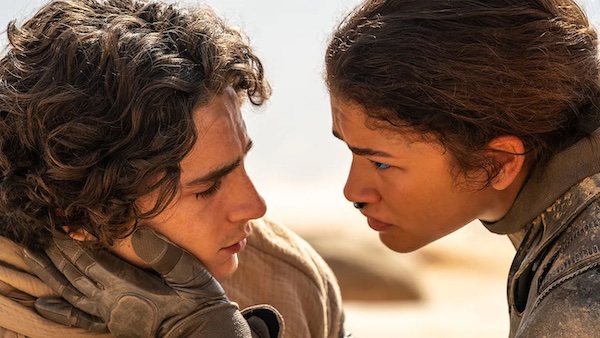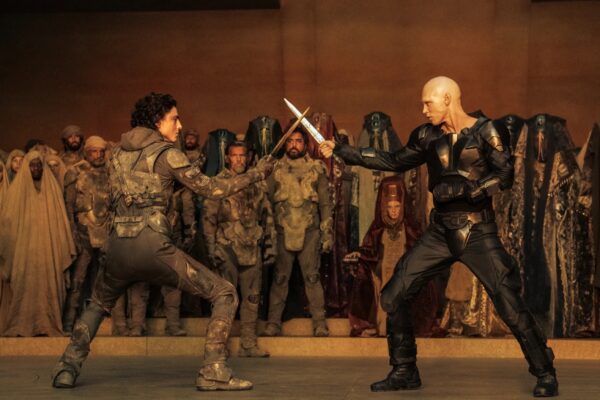Film Review: “Dune: Part Two” — A Stunning Achievement
By Michael Marano
Despite its flaws, Dune: Part Two is a grand, sprawling, and deeply intelligent science-fiction epic.
Dune: Part Two directed by Denis Villeneuve.

Timothée Chalamet and Zendaya in Dune: Part 2. Photo: Warner Bros
Of course, Dune: Part Two is Denis Villeneuve’s follow-up to his outstanding 2021 film, Dune: Part One. But Dune: Part Two follows up much, much more than that.
Like much of history, Dune: Part Two features lengthy scenes of pasty people stealing natural resources from brown people via gunships. Dune: Part Two continues the dialogue with colonialism begun in Part One, and geometrically expands it.
Dune: Part Two takes some narrative liberties with Frank Herbert’s novel. The film chronicles what happens to young Paul Atreides after the extermination of his family by the Harkonnens. But the narrative battens down on the political themes of the novel. In 1980, Herbert wrote in Omni Magazine: “Personal observation has convinced me that in the power area of politics/economics and in their logical consequence, war, people tend to give over every decision-making capacity to any leader who can wrap himself in the myth fabric of the society. …[D]on’t give over all of your critical faculties to people in power…. Beneath the hero’s facade you will find a human being who makes human mistakes. Enormous problems arise when human mistakes are made on the grand scale available to a superhero.”
Paul’s journey as he “goes native” among the Fremen in the deep deserts of Arrakis to become their T.E. Lawrence-like leader isn’t a Skywalker-y hero’s journey. It’s a disastrous superhero journey. After a skirmish early in the film, Paul is told, “You fought well, once you woke up.” The crucial issue is, what will Paul wake up as?
Paul wraps himself in the myth fabric of Fremen society, one that’s especially pernicious because it was seeded as propaganda among the Fremen to pave the way for a White Savior. As one character (and most of human experience) points out, “You want to control people? Tell them a messiah will come.”
In the previous film, Duke Leto, Paul’s father, schooled Paul on how their dynasty had been based on cultivating air power and sea power. Once on Arrakis, he instructed, they’d have to develop desert power. That’s only partly true. Paul’s means of accumulating desert power is through messianic religious power. That his doing so will likely lead to genocidal warfare across the Universe is just a teeny bit of a bummer.
These are heady topics to handle in a multi-bajillion-dollar piece of popular movie making. Given the thematic tonnage it hefts, Dune: Part Two has its understandable shortcomings. Ironically, Part Two is not as emotionally compelling as Part One. I never, ever thought I’d say this about a genre/franchise movie that’s 2 and three-quarters of an hour long, but Dune: Part Two is too short. Subplots and characters are underdeveloped in favor of subplots and characters that are (bewilderingly) overdeveloped. What’s the point of crowning Christopher Walken the Emperor of the Universe if you’re not gonna use him? (To his credit, Walken projects an utterly venal sense of moral exhaustion in the few scenes he’s in.) Princess Irulan (Florence Pugh), the Emperor’s daughter, is initially set up to be the audience’s guide through the political and historical morasses of the story. But she is promptly swallowed up by the machinations she started out commenting on. Scenes in which an unborn person is given a voice are kind of silly.

Timothée Chalamet and Austin Butler in Dune: Part Two. Photo: Warner Bros
Despite these flaws, Dune: Part Two is still a grand, sprawling, and deeply intelligent movie. Its faults are forgivable given its truly epic ambitions. For one thing, the film comments with disturbing precision on ugly shit happening in the world today. In a reality where religious nationalism is a looming threat, Paul’s political calculus — should he or should he not harness the fanatical beliefs of Fremen Fundamentalists? — is a little… unsettling. A rigged gladiatorial fight staged during a Nuremberg-like rally is a skin-crawly reminder of the ways in which spectacle can be depended on to drive the masses into a political frenzy.
The visuals, sound design, and sense of scope demand that you see Dune: Part Two on the biggest, best screen you can find. The sand, dust, heat, and sense of dehydration of the desert scenes are more palpable than the parched mise en scène of Lawrence of Arabia. Certain scenes, sets, and costumes seem to be hat tips to those of the famously failed Alejandro Jodorowsky adaptation of Dune from the mid-’70s (considered by many to be one of the greatest movies never made).
The performances are uniformly excellent. The span of a few years between the filming of Part One and Part Two serves Timothée Chalamet very well… he’s gone from a twinky teen to a young man. The passage of time has matured Paul’s bearing in ways the events of the first film would have. Rebecca Ferguson takes her role as Jessica, Paul’s mother, into some dark and uncharted territory. I lost count, but I’m pretty sure Stellan Skarsgård’s Baron Harkonnen indulges in all seven of the Deadly Sins — and does so with great aplomb. And Austin Butler as Feyd, the Baron’s nephew, manages to summon new levels of onscreen sociopathy without becoming cartoonish.
A good deal of Dune: Part Two is about Asymmetrical Warfare, as the Fremen, under the leadership of Paul, disrupt the Harkonnen’s exploitation of their planet. Viewed in this way, it is not too much of a stretch to see Dune: Part Two as follow-up to Gillo Pontecorvo’s The Battle of Algiers. And, because it is a story about the weaponization of faith as it relates to the exploitation of natural resources in a desert and the establishment of an Empire, Dune: Part Two might also be seen as a reply to There Will Be Blood, which dissected the two great engines of American Imperialism: fundamentalism and oil. Part Two also continues Part One‘s quoting of Apocalypse Now, and by extension, Heart of Darkness.
Dune, in the form of Herbert’s novels and their multiple film adaptations, has itself become part of “the myth fabric” of our society. One can only hope that the dialogue these two films have had with colonialism and empire-building will strengthen resistance to the rise of “superhero”/false saviors, the meglomatical ilk that Herbert warned against.
Even if it doesn’t prove to be effective in that admirable mission, Part Two is still a stunning achievement in filmmaking.
Film critic, novelist, writing instructor and personal trainer Michael Marano is on Threads at www.threads.net/@madprofmike and BlueSky at @mikemarano.bsky.social. He ditched Twitter, because of the fascism. His site is www.BluePencilMike.com
